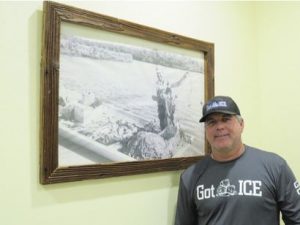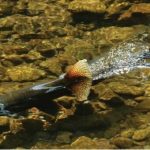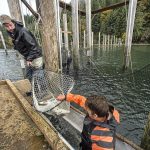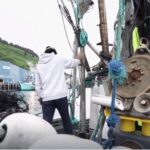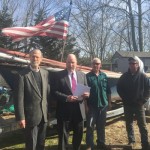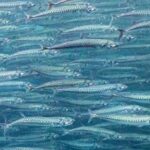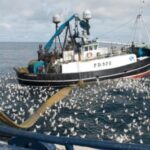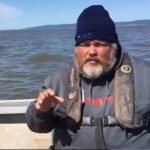Monthly Archives: February 2019
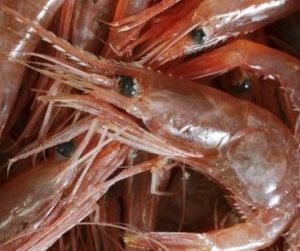
Northern shrimp stock plunges off the coast of Labrador
The federal Department of Fisheries and Oceans’ latest northern shrimp assessment shows a dramatic drop in the offshore Labrador stock, with a slight increase for the inshore fishery in Newfoundland. New data from DFO Monday reveal a 46 per cent drop in the fishable biomass — defined as the weight of all the shrimp larger than 17 millimetres — between 2017 and 2018 in Shrimp Fishing Area 4, along Labrador’s northernmost coast, to 42,100 tonnes. Heading south down Labrador’s coast to Shrimp Fishing Area 5, the biomass has dropped 43 per cent, to 80,100 tonnes. >click to read<
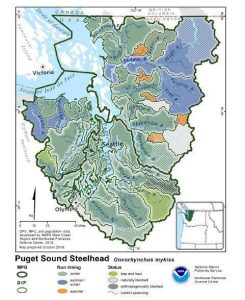
Feds release Puget Sound steelhead recovery plan
The National Marine Fisheries Service has drafted a recovery plan for Puget Sound steelhead, including those from the Skagit River. The fisheries service, which is a division of the National Oceanic and Atmospheric Administration, is taking public comment on the plan through March 28. A recovery plan is required for any species protected under the U.S. Endangered Species Act. >click to read<10:53

FISH-NL: Escalating war between fish processors/buyers exposes fact inshore harvesters have been ‘royally screwed’ on price of fish
The Federation of Independent Sea Harvesters of Newfoundland and Labrador (FISH-NL) says the existing system of setting fish prices in the province is broken beyond repair, and must be scuttled. “What’s absolutely clear from the escalating fight between processors and buyers is that inshore harvesters have been getting royally screwed on the price of fish,” says Ryan Cleary, President of FISH-NL. On Jan. 2, the Seafood Processors of Newfoundland and Labrador (SPONL) — representing 15 small, mostly lobster processors/buyers with a combined export value of roughly $40 million — lodged a complaint against Royal Greenland with the federal Competition Bureau, and asked for an intervention. >click to read<22:02

Let’s Take a Closer Look at This Big Fish Farm Proposal for the Samoa Peninsula
There have been lots of ideas in recent years for how to maximize the economic potential of Humboldt Bay. “More cruise ships!” some suggested. “More oysters!” “Less-restrictive zoning!” “How about a new railroad or two?” But as far as we can tell, no one even dreamed of suggesting that the Samoa peninsula could host one of the world’s largest indoor fish farms. No one imagined that Redwood Marine Terminal II, a contaminated brownfield site still littered with the rubble of an abandoned pulp mill, could be chosen to house a 600,000-square-foot, state-of-the-art aquaculture facility capable of supplying the West Coast with nearly 60 million tons pounds of fish per year. That concept, and the Norwegian company that plans to bring it to fruition, found us. >click to read<20:20
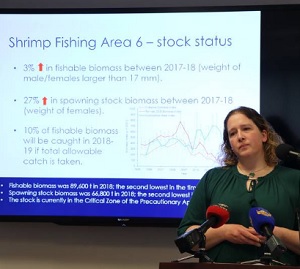
Small shrimp biomass increase off Newfoundland’s northeast coast
The latest news about the state of the northern shrimp stock in key Shrimp Fishing Area 6 off the province’s northeast coast is a bit more uplifting this year than about the same time last year. Last year the news was grim — this year, although the shrimp stock remains listed in the critical zone, the fishable biomass has increased by three per cent between 2017 and 2018, and there’s a 27 per cent increase in spawning stock biomass between 2017 and 2018. >click to read<19:33
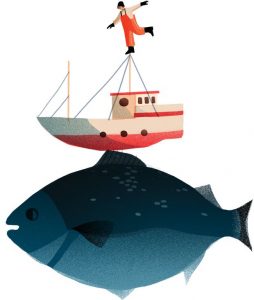
What I learned working with misfits, oddballs and hardened fisherman
I’ve always had a strange fascination with challenge and adventure. It’s a cliché, I know, but it has led me on some interesting journeys. Sometimes these journeys give me fragments of insight into the sneaky mysteries of life. For these reasons, I signed up to spend six weeks on a commercial fishing vessel last winter. I had never been to sea before, but – thanks to a family friend – I was able to get a job on one of the largest Black Cod fishing operations in the world. I left in early January, sailing the stormy winter waters of northern British Columbia near the Alaskan border. I joined a 13-person crew – 12 men and one woman – on a ship that was capable of handling hurricane-like weather. Brandon Kornelson >click to read<18:16
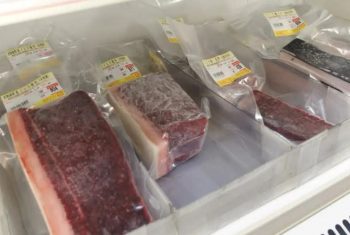
Why Japan risked condemnation to restart commercial whaling
Fishermen in the village of Taiji are counting the days until July, when they will be able to hunt large, fatty minke whales commercially for the first time in decades. The community, which faces the Pacific coast of central Japan, is still haunted by its moment in the international spotlight 10 years ago, when the documentary “The Cove” criticized its dolphin culls and attracted a flood of activists. Yet, a sense of optimism is spreading. “The availability of more types of whales will make more people interested” in eating the meat, predicted Shinichi Shiozaki, who sells processed whale products. “It’s a good thing.” >click to read<13:14
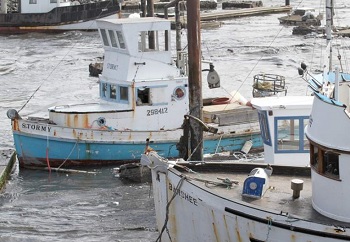
Charles Schnacker, Come to the Edge: Arrival and Survival in Del Norte County
Charles Schnacker reveals an intense tenacity and love for fishing, one that goes deeper than profit. But his essay also reveals hidden gems about scarcity and abundance in Del Norte County: I was born in Nashville, Tennessee, and I grew up in Idaho—Lewiston, Craigmount, Nez Perce. And then we moved here in 1984, when I was in grade school. I enrolled in Crescent Elk. Then I went to Del Norte High but transferred to Sunset High School because they let me use math classes as my electives, and I really liked math. When we first moved out here my mom, my dad, me, my five brothers, Grandma, three cousins, two aunts and two uncles lived at Pacific Shores, near Kellogg Beach. We camped out on the dunes for two months until my dad got a job at Las Palmas Trailer Park. We lived there for a short time in one of the trailers until we bought a house on Cooper in the 700 block. It was the first house I remember my family owning. I liked it here. I grew up fishing. My dad started out beach fishing for smelt at night and for perch during the day. Then he bought a boat and crabbed. I pretty much did the same thing. >click to read<12:27
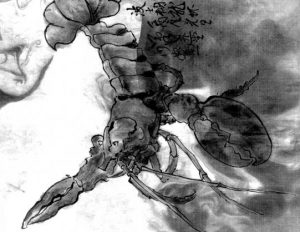
Lobster’s underbelly is as tough as industrial rubber
Flip a lobster on its back, and you’ll see that the underside of its tail is split in segments connected by a translucent membrane that appears rather vulnerable when compared with the armor-like carapace that shields the rest of the crustacean. But engineers at MIT and elsewhere have found that this soft membrane is surprisingly tough, with a microscopic, layered, plywood-like structure that makes it remarkably tolerant to scrapes and cuts. This deceptively tough film protects the lobster’s belly as the animal scuttles across the rocky seafloor. >click to read<11:10
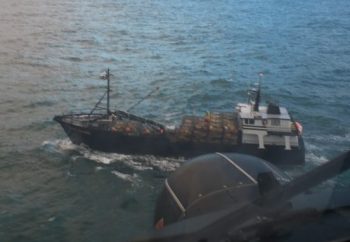
Coast Guard medevacs man from fishing vessel 201 miles north of St. Paul, Alaska
A Coast Guard Air Station Kodiak MH-60 Jayhawk helicopter crew, forward-deployed to St. Paul, medevaced a man from the fishing vessel Kari Marie approximately 201 miles north of St. Paul, Alaska, Monday. District 17 Command Center watchstanders received notification from the fishing vessel Pacific Mariner. They were relaying communications for the fishing vessel Kari Marie for a crew member that was reported to have suffered a compound fracture while aboard the vessel. >click to read<09:27

Commercial Fisherman George Mendonsa, whose Times Square kiss became an iconic photo, dies at 95
George Mendonsa never doubted that he was the sailor in Alfred Eisenstaedt’s famous photo from Times Square, when news broke in 1945 that Japan had surrendered and World War II was ending. Eisenstaedt shot four quick frames of Mr. Mendonsa kissing a stranger, Greta Zimmer Friedman, and a photo of their brief embrace became one of the era’s most iconic images. It was unforgettable for Mr. Mendonsa, too. “This moment put magic into my life,” he told the Globe in 1988. Mr. Mendonsa, a well-known commercial fisherman in Rhode Island, was 95 when he died early Sunday from complications of falling a short time earlier in an assisted living center. He had lived in Middletown, R.I., most of his life and would have turned 96 Tuesday. >click to read<21:30
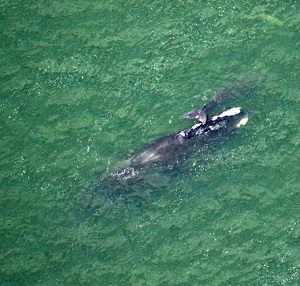
Lucky number 7: Seventh right whale calf spotted off Atlantic coast
One by one, the critically endangered right whales here for this winter’s calving season are delivering new babies that raise optimism among whale researchers. A seventh North Atlantic right whale calf was confirmed this weekend off the Georgia coast, according to National Oceanic and Atmospheric Administration Fisheries. “Every calf that gets us closer to 10 or a dozen is very encouraging,” said Jim Hain, senior scientist and project coordinator for the Marineland Right Whale Project. The newest mom is Pico, or No. 3270. She’s a 17-year-old whale whose last known calf was born in 2011. >click to read<20:48
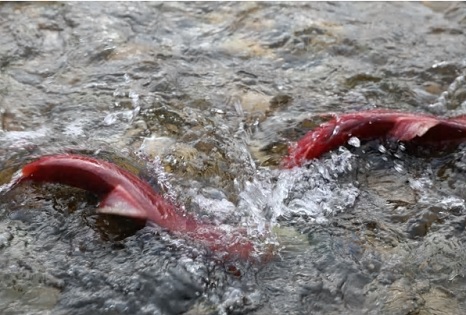
Fisheries official says 2018 saw a ‘reasonably good return’ despite low numbers
The number of sockeye salmon that made it up the Fraser River last fall was lower than originally predicted, prompting a conservation group to blame the federal fisheries regulator for allowing the area to be overfished. “This year, it was the lowest run or spawning return they’ve seen on record on this cycle,” Greg Taylor told CBC Radio’s Daybreak Kamloops host Shelley Joyce. “They were very disappointing,” said Taylor, a senior fisheries advisor for the Watershed Watch Salmon Society.,,, A DFO representative told Joyce on Thursday that, while the numbers were lower than predicted, the return numbers were not out of the ordinary >click to read<20:14

Connecticut’s Commercial Fishermen Express Interest In Two Bills
Two bills that could have a big impact on Connecticut’s multi-million dollar commercial fishing business were the subject of an Environment Committee public hearing Friday. The legislation would allow commercial fishermen to take one day’s catch and bring them across state lines — to Rhode Island and New York — not just Connecticut. The other bill would “prohibit the possession and trade of shark fins in the state.” The aim is to protect sharks from skinning for trade but commercial fishermen are worried that the bill may lead to a complete ban on shark. >click to read<18:30
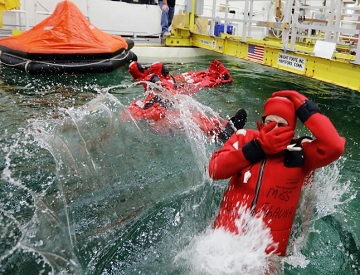
Free training prepares fishermen because ‘every second counts in an emergency at sea’
Fishing Partnership Support Services is offering programs in New Bedford to make life safer for those who have one of the world’s most dangerous jobs, commercial fishing. Safety and Survival Training will be from 7 a.m. to 3 p.m. March 7 at the School for Marine Science and Technology of the University of Massachusetts, 706 S. Rodney French Blvd. Drill Conductor Training will be at the same location from 8 a.m. to 4 p.m. March 8. There is no charge for either program, and lunch is provided both days. A team of certified marine safety instructors will lead both programs, according to a news release. Safety and Survival Training will cover: >click to read<14:37
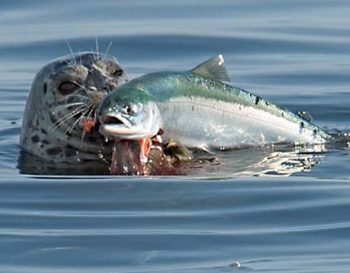
Salmon are going the way of the buffalo! West coast group campaigns for seal, sea lion harvest
A group lobbying for a commercial harvest of harbor seals and sea lions on the West Coast is encouraged after meeting with federal fisheries officials. Richmond-based Pacific Balance Pinniped Society is pressing Fisheries and Oceans Canada (DFO) to consider a managed Indigenous fishery for seals and sea lions. Society members are convinced that a pinniped explosion is a contributing factor to declining populations of wild salmon and other finfish along the B.C. coast. “Our salmon are going and will go the way of the buffalo unless we do something,” said Thomas Sewid, founder of the society. “It’s not just fish, it’s a way of life.” >click to read<12:32
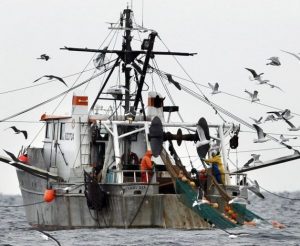
New England: Shrimpers hope industry lost to warm seas won’t be forgotten
Glen Libby looks back fondly on his days as a Maine shrimp trawler, but he’s concerned about what seafood lovers will think if the shuttered fishery ever reopens. “Shrimp? What are those?” he said. “There will be a market. But it depends how big of a market you’re talking about.” Maine’s historic shrimp industry has been closed since 2013 due to a loss in population of shrimp off of New England that is tied in large part to warming oceans. And with a reopening likely several years away — if it ever happens at all,,, >click to read<10:44

DON CUDDY: Local expert diver, Dartmouth’s Steve Cassidy, recalls 1975 Atlantic Sword tragedy
The recent passing of Harriet Didriksen, owner of New Bedford Ship Supply, signifies the loss of yet another link to the city’s long and rich fishing heritage. It was perhaps that sad news which inspired me to seek out another of the old-timers whose lives were spent on the city’s waterfront. South Dartmouth’s Steve Cassidy is a young 91 years of age. He has accumulated, and still retains, an encyclopedic knowledge of the boats, and the men who fished on them, from the SouthCoast area over the last six decades.,,, As I sat in his living room this week he shared some of his memories with me and reflected particularly on a tragedy that is now long-forgotten but one that has never left him. >click to read<19:53
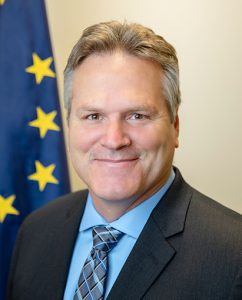
Alaska fishing towns would forfeit $28M in fish tax under Dunleavy budget
Governor Mike Dunleavy’s proposals for balancing the state’s budget include a plan to stop sharing of millions of dollars in taxes on commercial fishing with coastal communities. “The governor’s budget is — the message he’s sending is that we’re simply — we’re out of time and we’re out of money,” said Dunleavy’s press secretary Matt Shuckerow. Landing and business taxes on fisheries – often referred to as raw fish tax – are collected by the state. >click to read<13:45
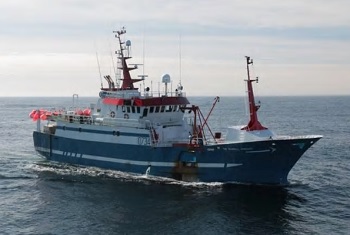
Clearwater pulls plug on storing lobster traps at sea
North America’s largest shellfish producer, Halifax-based Clearwater Seafoods, says it has stopped storing lobster traps at sea. Clearwater’s practice of leaving thousands of pots on the ocean floor for weeks at a time earned it a conviction for a “gross violation” of Canadian fishery rules. Unlike every other lobster fishery, there is no season and Clearwater has been awarded a quota of 720 tonnes, which it says represents about 15 percent of all lobster it sells. >click to read<12:58
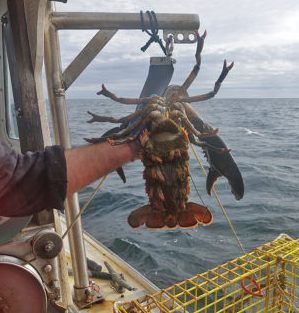
Efforts Underway to Reduce Lobster Fishing Gear to Help Rare Whale
Interstate fishing managers are starting the process of trying to reduce the amount of lobster fishing gear off the East Coast in an attempt to help save a declining species of rare whale. The Atlantic States Marine Fisheries Commission announced this month that it would consider options designed to reduce vertical lobster fishing lines in the water by as much as 40 percent. The commission said it would try to reduce the amount of gear with a combination of trap limits, seasonal closures, changes to gear configuration and other methods. The rules are under development and it will take months before they come up for public hearings. >click to read<10:45

Coast Guard assists good Samaritan vessel to rescue five people from sunken fishing vessel near Dutch Harbor, Alaska
Two Coast Guard Air Station Kodiak helicopter aircrews searched and assisted the good Samaritan fishing vessel Kona Kai with locating five people in a life raft from the sunken commercial fishing vessel Pacific 1, approximately 40 miles west, southwest of Dutch Harbor, Alaska, Friday. The Kona Kai safely recovered all five people from an inflatable life raft that was deployed from the Pacific 1 upon sinking. All five people were safely transported to Dutch Harbor and were reported to have been in good condition. >click to read<18:34
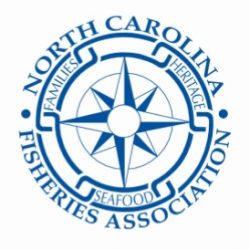
North Carolina Fisheries Association Weekly Update for February 15, 2019
>Click here to read the Weekly Update<, to read all the updates >click here<, for older updates listed as NCFA >click here<16:50

Mourners pay final tribute to Congressman Walter B. Jones
He was a devoted husband and father who wanted to be remembered for his integrity and love of God and the Catholic Church. He also was the voice for veterans, farmers, fisherman, businessmen and everyone in between. And when he went off to Washington, he was not afraid to go against his own political party if it meant doing the right thing. These tributes and others were shared as friends and colleagues of the late U.S. Rep. Walter B. Jones Jr. gathered in Greenville to honor him on Thursday afternoon. >click to read<15:52
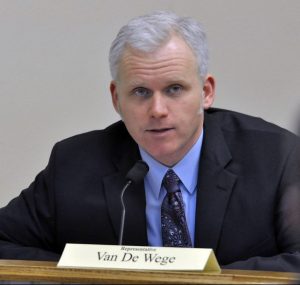
The Salmon Wars in the Pacific Northwest: Banning the Rough Customer
This week in Olympia, the Senate Agriculture Committee held a public hearing on Senate Bill 5617 to ban nontribal gillnetting in Washington state. The legislation would eliminate 445 small fishing businesses in rural and coastal areas. Despite the treacherous snow conditions throughout western Washington, commercial fishermen and tribal representatives packed the chamber and an overflow room, driving through the slush from far-flung places like Wahkiakum, Skamania, Ilwaco, Astoria, the San Juan Islands, Willapa and Bellingham. Also present was a sprinkling of red-hatted CCA sport fishers, hoping to drive a stake through the heart of the commercial fishing industry. >click to read<15:24
B.C.-led international expedition to probe ailing Pacific salmon stocks
An unprecedented international collaboration could revolutionize salmon science and fisheries management, return forecasting and even hatchery output. Nineteen scientists from Russia, Canada, the United States, Japan and South Korea are set to probe the secret lives of five Pacific salmon species with a four-week grid search and test fishery across the Gulf of Alaska. The expedition begins next week aboard the Russian research ship MV Professor Kaganovsky. “We know virtually nothing about what happens to salmon once they leave near-shore waters in the Salish Sea,” said expedition organizer Dick Beamish. >click to read<13:56

MSC Sustainability rating drops for Clearwater’s offshore lobster fishery
Clearwater Seafoods’ offshore lobster fishery in Eastern Canada has lost its “recommended” rating from Ocean Wise, a seafood sustainability recommendation program of the Vancouver Aquarium. It’s more fallout from a 2018 conviction for what the Crown called a “gross violation” of a Canadian fisheries regulation by Halifax-based Clearwater. In a separate action, the Marine Stewardship Council, another much larger eco-sustainability organization, has moved up its scheduled “full surveillance audit” of Clearwater’s offshore lobster fishery by two months to April. >click to read<11:00
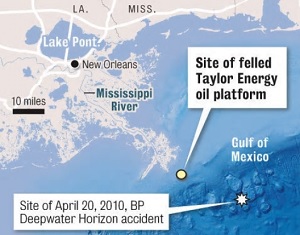
Gulf of Mexico: 14-year Taylor Energy oil leak could be two times larger than BP spill
A toppled oil platform that has been leaking into the Gulf of Mexico for more than 14 years may have released much more oil than recent estimates have indicated, possibly pushing the total volume well beyond BP’s Deepwater Horizon oil disaster. New research indicates 2,100 to 71,400 gallons of oil are escaping each day from the Taylor Energy platform site, about 10 miles from the mouth of the Mississippi River. The high estimate of 71,400 gallons per day is more than two times larger than the highest potential rate cited by the Coast Guard when it ordered Taylor to fix the problem late last year. >click to read<10:24

Cushing fishing boat captain gets 4 years for causing deaths of 2 crewmen
Christopher A. Hutchinson, 30, was sentenced in U.S. District Court in Portland by Judge D. Brock Hornby for two counts of seaman’s manslaughter. The bodies of 27-year-old Tom Hammond and 15-year-old Tyler Sawyer were never found. Hutchinson was the captain of the lobster boat No Limits, which sank near Matinicus Island in a storm on Nov. 1, 2014. He purchased 20, 30-milligram oxycodone pills from two separate drug dealers, smoked marijuana with Sawyer’s father, and drank a rum and coke at a Rockland restaurant on Halloween 2014, court documents say. He then departed for a fishing trip at 1 a.m. from Linda Bean’s dock in Tenants Harbor. Rain was beginning to fall, and the forecast called for a gale. >click to read<22:59






